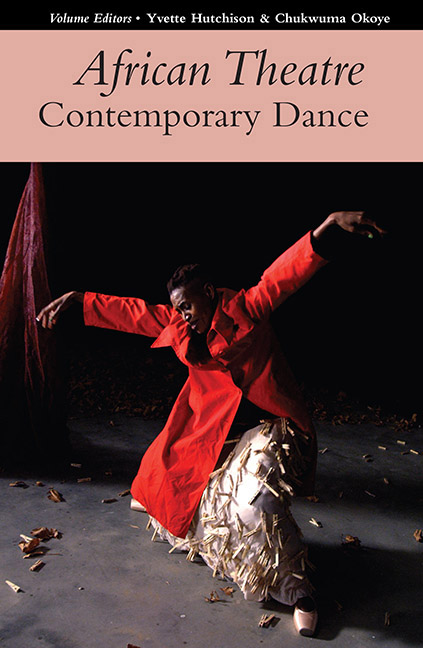Introduction
Published online by Cambridge University Press: 26 July 2019
Summary
This is an exciting moment for African Theatre as we move towards a new approach which has both themed and open sections of papers.
For the themed section on Contemporary Dance, we have sought to trace the diversity of contemporary African dance and physical theatre practices across the continent, in the diaspora, and as inspiration for new, contemporary dance forms more widely. As a continent, Africa has an incredibly vibrant history of dance as well as contemporary practice. However, there is tension between what is considered ‘traditional’ dance, which is seen as being rooted in African societies and often linked to spiritual or ceremonial practices and occasions, and more contemporary forms of dance that have been influenced by Africa's contact with the global North, via colonialism and media. This tension has spawned a plethora of creative responses stretching from the purist to a diversity of hybridised categories; from the most traditional to the most Euro-American. Thus, there are individuals and companies whose forte is either ‘traditional’ or ‘contemporary’, or, more commonly, anything in between. In addition, forms that have developed in the global North, like break dancing and hip hop, are returning to Africa and defining youth culture in new ways. For example, break dancers from across Uganda, Kenya and the Democratic Republic of the Congo performed at the Batalo East Dance Fest in Uganda in 2014.
However, it is also clear that dancers and choreographers are wrestling in unique ways with issues of representation – of race, class, gender, ability in and through the body in dance – and socio-cultural realities. Interestingly, what comes across in their engagement with these issues is not a programmatic de-colonial scheme, wielding an uncritical approach to either traditional and contemporary forms, but a healthy, more personal and pragmatic posture. This is evidenced by the way choreographers and dancers critically but sinuously respond to the cultures of the global North and that of ‘traditional’ Africa. Thus, it is evident that today dance and dance-based practices flourish creatively and critically in Africa and its Diasporas.
- Type
- Chapter
- Information
- African Theatre: Contemporary Dance , pp. xv - xxiiPublisher: Boydell & BrewerPrint publication year: 2018

